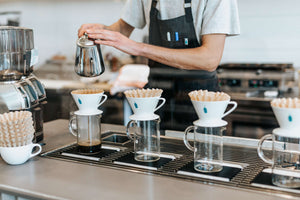There are two types of home coffee makers.
Either you're the person who approaches their morning brew as a ritual, with a favourite mug or perfect blend, and watches the clock to ensure they've steeped their grounds for the exact amount of time.
Alternatively, you're the person who chucks on the kettle or dumps a rough amount of coffee in the machine and drinks it scolding hot to try and energise your eyelids.
One drinks Hoxton House Blend and the other Proper Strong, but we'll leave it to you to guess which way around that goes!
However, they have one thing in common: they want their coffee to taste incredible and pack a caffeinated pick-me-up punch.
So, if you want a fantastic cup of coffee and you're brewing at home, let's compare a French press (aka a cafetiere) to a pour-over coffee so you can pick the right tools for the job.

Making Coffee With a French Press
A French press/cafetiere/coffee press (all the same thing!) is normally made of glass and has a plunger you use to push the water through your coffee grounds and a filter to stop the beans from getting into your cup.
First used in the late 1920s in Italy - despite a slightly misleading name - a French press is pretty impossible to use incorrectly.
The brewing process couldn't be easier:
- Add your coffee grounds.
- Pour in hot water.
- Leave to steep.
- Press down the plunger.
- Pour and sip!
It's very simple, takes about four or five minutes max, and you get a rich cup of coffee, although you'll often find a few rogue bits of the blend at the bottom of your mug.
The Pros and Cons of French Press Coffee
The good thing about this brewing method is that the oil from the beans is drawn into the brew, so you get a much bolder and well-rounded flavour.
You can experiment with different coffees, strengths and coffee grind textures, or try mixing up the amount of coffee you add and how long you steep it to test how that impacts the finished brew.
The filter in the French press removes all the bigger chunks of coffee, but tiny particles will sneak through, so you get a gritty mouthful in your final gulp.
However, the biggest annoyance for most people who use a cafetiere is that they're a real pain to clean.
While some French press brands are dishwasher proof, it's all too easy to damage the delicate mesh filter if the temperature is too high, and manufacturers often recommend hand washing.
How to Make Pour-Over Coffee at Home
Pour-over coffee is a little fiddlier than a French press, although it's not rocket science (it's coffee, after all!).
You can get pour-over coffee carafes, which use disposable filters in the top compartment where you put your ground coffee, or one-use pour-over filters that sit on top of your cup.
The grounds go in the filter or cone-shaped bit at the top, and you dampen them slightly for a few seconds, and then add more water.
Hot water soaks through the coffee and produces a lighter brew without any of the grit you get with a French press.
It takes around three or four minutes to make a cup, and the coffee is lighter because some of the acidity and natural oils are removed as the water drips through the filter.

The Pros and Cons of Pour-Over Coffee
Both of the niggling annoyances of a French press don’t apply to pour-over coffee.
You don't have to mess around hand washing all the parts, and you won't get any bits in the bottom of your mug.
However, if you love a rich, powerful coffee, you might find that pour-over coffee isn't for you, since it makes the flavour profile a little weaker.
To Pour-Over or to French Press?
From an environmental perspective (Hoxton Coffee Roasters are passionate about our closed-loop carbon negative approach!) a disposable filter isn't a winner.
You might decide a French press is worth the washing if you like your coffee mean but green.
But, ultimately, your choice of a French press or pour-over coffee is down to you.
French press coffee is best for coffee lovers who want a bold brew that takes minimal time to make, whereas pour-over is smoother and less of a shock to the system if you don't like your coffees super strong.

